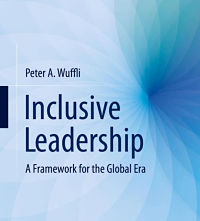Inclusive leadership: a framework for the global era (2015)

“…leaders no longer understand global financial ecosystems’ complexity… fragmented actors make millions of decisions in isolation …finance and capitalism have decoupled from economic value and the values of civilisation itself. Tomorrow’s leaders must think more inclusively to solve these challenges.”
Peter Wuffli. Former UBS CEO
Springer
Adapted from the Forbes review by contributor Brook Manville:
Inclusiveness is bigger than ethnic diversity, gender equality or participatory management. It’s about dealing with the fragmentation of knowledge (to solve growing problems); and the fragmentation of ethical belief systems (to guide moral choices).
Wuffli was forced out as CEO of UBS, one of the world’s biggest banks, in 2007. On reflection, Wuffli reasoned that his misfortune was a small piece of a bigger world problem, a broad-based ‘failure of imagination’ – leaders everywhere not understanding the complexity of global financial ecosystems, and the unintended consequences of so many fragmented actors making millions of decisions in conceptual isolation.
He also felt that finance and capitalism more generally had become decoupled from economic value and the values of civilization itself: the pace and complexity of change outstripped the trust of human institutions.
What was needed were ‘partner-like’ leaders who thought more inclusively about their work, social roles, and connections to people and knowledge outside their jobs.
Wuffli argues that tomorrow’s leaders will combine three dimensions of thinking and acting; a ‘One World Perspective’ (understanding and integrating across boundaries, organizationally and globally); commitment to ‘New Capitalism’ (meeting society’s demands for more ethically responsive markets); and ‘Liberty-centric Ethics (pursuing the ‘good life’ that balances freedom of choice and personal responsibility).
Wuffli offers four practical steps to becoming a more ‘inclusive leader’:
- Get to know the world better: Don’t just visit airports or hotels. Broaden your horizons by working and living in other countries. Seek developing world postings if you’ve never lived outside of Western economies
- Get To know other sectors: Move across industries in your career. Seek jobs and projects not just in other business sectors, but also in non-profit and civic organizations
- Get engaged politically: If you’re privileged to live in a democracy, join the fray and learn. The political process will become steadily more important in the global economy
- Maintain family and friends. Economic and political turbulence will continue to rise in the interconnected world. Hold dear your social anchors.
Buy the book here (available by the chapter): Inclusive leadership.
Read the Forbes review here: Thinking differently about inclusiveness.






Leave a comment (1)
Back to the topThe crisis of leadership derives largely from the gulf between the complexity of the real world and human thinking. Leaders who can only think in logical terms (here meant to include conventional systems thinking) are in no position to quit the irrealism of today’s educational system and management “philosophies”. Irrealism means, following Bhaskar, squeezing insight into natural necessity out of the picture by falling prey to “epistemic fallacies” (like that the world is what we know about it, or that reified knowledge in the form of facts is anywhere near to what is real in the world. But there are ways out of this. I sketch one of them in “Dialectical Thinking for Integral Leaders”, which is based on the lifelong cognitive development of adults. Sorry, no short-cuts available. But if you are reasonable developed cognitively, there are supports waiting for you in the zone of proximal development: where you might step next. It’s only that you need to revolutionize your thinking, not your bank account.